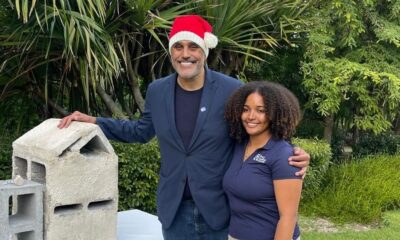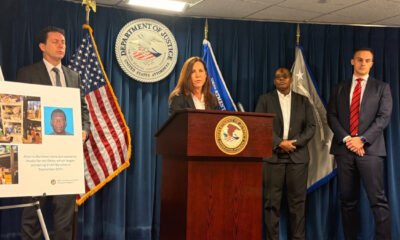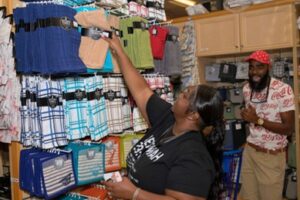NASSAU, The Bahamas – Participants of the Ministry of Social Services, Information and Broadcasting’s Camp Inclusion, including the camp’s student advocates, recently toured Nassau Cruise Port in a move designed to produce multiple benefits for the children.
Camp officials said the tour was part of the “moving away” from the old tradition of keeping children with disabilities locked away at home, and towards greater social inclusion for persons with disabilities – especially children.
Facilitated by the Community Affairs Division of the Ministry of Social Services, Information and Broadcasting at the Flamingo Gardens Family Life Centre, the camp is a collaborative effort between the Ministry, its Community Affairs and Disability Affairs Divisions, the Bahamas Coalition of Advocates for Disability Awareness and Service (BaCADAS), and the National Commission for Persons with Disabilities (NCPD). The majority of the Camp Instructors are persons with disabilities.
The Camp is in keeping with the Global Family Day 2024 theme of “Embracing Diversity, Strengthening Families,” and is an extension of the Ministry’s continued efforts to take the lead in ensuring access and inclusion for all — particularly the community of persons with disabilities — in every aspect of society.
Children with different levels and types of disabilities, along with student advocates, participated. Its focus was to ensure that participating youth learn about living with mobility and intellectual disabilities, advocacy, inclusion and accessibility.
Mr. Townsley Roberts, Deputy Executive Secretary of the Secretariat of the National Commission for Persons with Disabilities, said the visit is expected to have a number of expected outcomes.
the visit is expected to have a number of expected outcomes.
“It was very important to get the kids out and for them to see parts of the island that they rarely get a chance to experience,” Mr. Roberts said. “It was also an opportunity for them to feel a part of the Bahamian society because many times they are kept at home or just in the classroom (and) so this gives them a chance to spread their wings; an opportunity to dream. You never know, something they saw today can spark their imaginations and some may become artists, want to work in the tourism field or even just to try and experience a cruise. The ability to dream, to feel a part of society, to feel included, is important to the growth of all children, including persons with disabilities.”
Mr. Roberts applauded officials at Nassau Cruise Port for agreeing to the tour, which he said also allowed chaperones to inform the student advocates of some of the aspects that makes a facility accessible and inclusive.
“We are so happy that the Cruise Port allowed us the opportunity to come and tour the facility. As the name of the camp goes, what we are promoting is inclusion — total inclusion in all aspects of Bahamian society including the culture, and the open spaces. We want to make sure that all spaces are accessible and one of the things we know, because we had the opportunity to inspect the cruise port, is that the Port is accessible to persons with disabilities. So why not bring the children – including the student advocates — here as a means of helping them to understand and to witness first-hand what accessibility means and how it, or the lack of accessibility, affects the lives of persons with disabilities.”
Mr. Antoine Munroe, a Camp Instructor and employee of the Disability Affairs Division of the Ministry of Social Services, Information and Broadcasting, said access and inclusion ensures that every person is able to achieve the same outcomes whether in social, educational, or employment settings, and are the best methods of ensuring that persons with disabilities are given the same opportunities to participate in society. He applauded the inclusion of the student advocates in the camp.
“It is a passion of my own to see young people included and exposed to the life of persons with disabilities. Being able to tour the facility gave me an understanding of how I can use my cane to move about with a little assistance and I thought that was very, very smooth. I congratulate those persons who were able to cause this to happen, and also the persons in charge of the Nassau Cruise Port. I think this is a very good step in the right direction,” Mr. Munroe added.
Release: BIS
(BIS Photos/Patrice Johnson)




 TCI News5 days ago
TCI News5 days ago
 Bahamas News4 days ago
Bahamas News4 days ago
 TCI News5 days ago
TCI News5 days ago
 TCI News5 days ago
TCI News5 days ago
 Bahamas News5 days ago
Bahamas News5 days ago
 Bahamas News4 days ago
Bahamas News4 days ago
 Bahamas News4 days ago
Bahamas News4 days ago
 USA3 hours ago
USA3 hours ago















